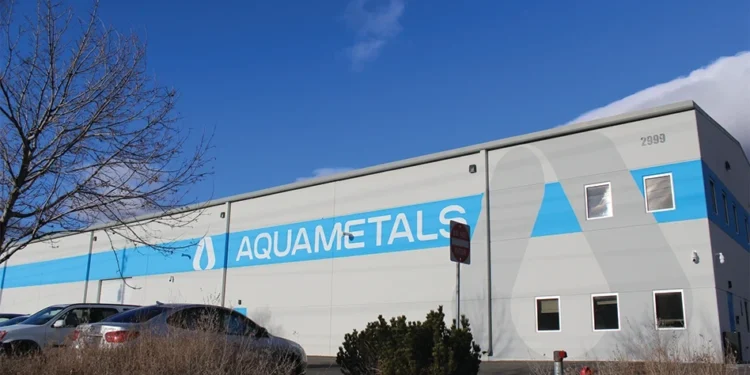According to Globenewswire, Aqua Metals, Inc. has reached a major milestone in the U.S. battery recycling industry by successfully producing the first-ever cathode active material (CAM) made entirely from domestically sourced, recycled nickel. This achievement marks a significant step toward creating a sustainable, closed-loop battery supply chain in the United States.
The recycled battery-grade nickel, extracted through Aqua Metals’ AquaRefining™ process, is now undergoing testing by a tier-one lithium battery manufacturer to determine its compatibility with next-generation EV batteries and other energy storage applications.
The Role of AquaRefining™ Technology
Aqua Metals’ AquaRefining™ process offers a low-emission, sustainable alternative to traditional metal refining methods such as smelting and chemical-intensive hydrometallurgy. The company has developed a closed-loop system that allows for the:
- Recovery of high-purity nickel from spent lithium-ion batteries and battery manufacturing scrap.
- Refinement of recycled nickel into battery-grade nickel nitrate, a crucial precursor for CAM production.
- Conversion of nickel nitrate into CAM using a low-carbon manufacturing process.
The CAM produced from this process has already met industry-standard chemical and electrochemical specifications during initial testing, ensuring its suitability for high-performance lithium-ion batteries.
Reducing the Carbon Footprint of Battery Materials
Compared to traditional methods of sourcing nickel from China, Aqua Metals’ domestic recycling approach:
- Reduces carbon emissions by an estimated 87%.
- Eliminates sodium sulfate waste, a byproduct of conventional CAM production that poses environmental risks.
- Supports a cleaner and more secure U.S. supply chain for critical battery materials.
According to Steve Cotton, President & CEO of Aqua Metals:
“This milestone confirms that Aqua Metals’ technology enables the reclamation and reuse of critical minerals entirely within the United States, supporting both energy security and the clean energy economy.”
Why Onshoring Battery Materials is Critical for U.S. Energy Security
The Growing Need for Domestic Battery Production
With the U.S. lithium battery industry projected to surpass 1.2TWh of annual cell production capacity by 2030, securing a stable and sustainable supply of key materials like nickel, cobalt, and manganese is becoming increasingly urgent.
Currently, much of the U.S. battery supply chain relies on imports from foreign sources, making it vulnerable to:
- Geopolitical disruptions affecting critical mineral access.
- Supply chain bottlenecks that slow down production.
- Price volatility in global raw material markets.
By onshoring battery materials production, Aqua Metals is positioning itself as a key player in securing U.S. energy independence while also aligning with federal policies such as the Inflation Reduction Act (IRA), which incentivizes the domestic production of battery components.
Advancing Sustainable CAM Production with Lower Waste and Higher Efficiency
Eliminating Environmental Hazards in Battery Recycling
Traditional CAM manufacturing relies on carbon-intensive refining that generates toxic byproducts. In contrast, Aqua Metals’ closed-loop production process:
- Uses electricity-powered electroplating instead of polluting furnaces.
- Recovers battery materials with minimal emissions and waste.
- Reduces reliance on hazardous chemicals in refining.
This eco-friendly approach not only benefits the environment but also lowers production costs, making sustainable battery materials more competitive in the global market.
The Future of Clean Battery Recycling
This breakthrough is only the beginning for Aqua Metals. The company is now focused on:
- Completing additional qualification testing with its tier-one battery manufacturing partner.
- Expanding its capacity to produce sustainable CAM at scale.
- Collaborating with more U.S.-based battery producers to establish a fully circular supply chain.
As global demand for lithium-ion batteries grows, Aqua Metals’ innovative recycling technology is setting the stage for a more sustainable, efficient, and resilient energy future.
Conclusion
Aqua Metals’ successful production of the first U.S.-sourced, recycled nickel CAM marks a major milestone in energy independence and sustainability. By demonstrating that high-performance CAM can be manufactured entirely from domestically recovered materials, this achievement reduces carbon emissions by 87% compared to traditional nickel sourcing, supports a circular battery economy by minimizing waste and dependence on new mining, and strengthens the U.S. supply chain in alignment with federal clean energy initiatives.
Want to stay updated on the battery industry? Check out the latest news on BatteriesDaily!











